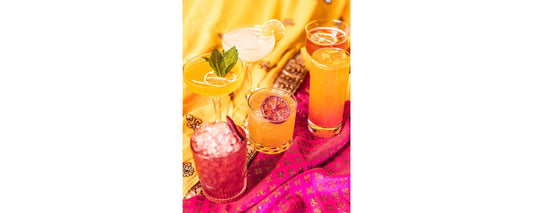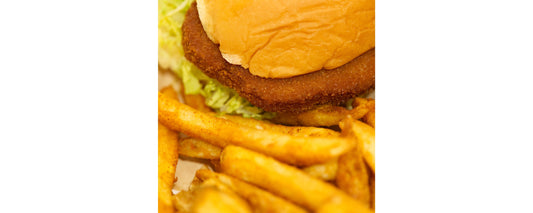Wildcat, a new restaurant on Whitney Avenue in Hamden, bills itself as cocktail-forward. This is true in a literal sense, as its cocktail menu came together first, drawn from popular favorites that had traveled with co-owners and brothers Shane and Kris McGowan from Tavern on State (where the former had been a partner) as well as popup tiki bars the McGowans had since put on in other New Haven taverns (and at least one tattoo parlor). With the tiki concept, Kris explains, “we were traveling around to our friends’ places. Ordinary… [Old] Heidelberg, the rooftop bar [at] the Blake Hotel… We’d go in, revamp the entire space, decorate tiki-style, grass awnings and things like that… A completely different food and drink menu. We’d get there really early in the morning, get it all ready, run the whole event, then break it down at the end of the night.”
Now they and their bartending team serve those and other concoctions from a bar that runs the length of their own dining room. Additional bar-style seating runs parallel to that, with 2-seater tables that can be brought together along the opposite wall to accommodate both solitary and social diners. An intimate decor of rich teal and wood tones is lit at candle intensity and boasts a cathedral ceiling.

At Wildcat, “cocktail-forward” also points to the extension of the bar into territory usually held by the kitchen. I sipped a stirred drink called the Early Bird ($15), made with tequila, grapefruit oleo, white shoyu, mole bitters and duck fat-washed mezcal. Bartender Kevin Peterson served it with a genteel smirk and relayed its origins. “I knew that we had duck fat here, and mezcal tastes very nice with poultry flavor.” Peshuga, Peterson recalled, is a style of mezcal made with raw chicken, or sometimes a whole turkey. “I knew they already kind of worked together, so I wanted to do it myself.” He appropriated the duck fat that the kitchen uses to confit. I sipped with trepidation, then with excitement. The Early Bird was a pale yellow in a lowball glass, refreshing but also gratifyingly smoky.
My favorite drinks tend to introduce surprising savory elements to the base sweetness of the spirits. For the No Snow In Mexico ($15), a shaken cocktail made summer-ready by passion fruit, herbes de Provence imparted nuance and character. “Front of house and back of house kind of bleed together,” Kris says. “When they were playing with a fun ingredient, I was like, I want to play. Brian [Burns, the sous chef,] was smoking tomatoes out in the back, and I was talking to him. I was like, I kind of want to see what I can do with a smoked tomato cocktail.”

The bar’s spirit of inquiry extends into the kitchen, and then further back to the kitchen receiving door. My Early Bird had been paired with a Ceviche ($18) designed to evolve with the seasons while retaining its seafood base. Burns had quickly worked out “the nice pop of acid” he wanted from a combination of lime and yuzu in the marinade but had mulled over the fish. “That’s the great thing about being able to work with these fish purveyors”—the local fish vendors they receive deliveries from. “I just started talking to the guy, and they sent us over some samples. We went with the red snapper.” My ceviche was indeed charged with sour citrus flavor, enough to neutralize the taste of the perfectly sized bites of snapper and instead highlight their pleasing pillowy texture.

The Seared Oyster Mushrooms ($26), the sole vegetarian entree (vegan if you hold the butter), likewise benefitted from an eye for what, in restaurant parlance, was “showcasing.” The mushrooms, presenting as meaty in a hearty Caribbean-inspired stew, were served in a beautiful bouquet still attached at the root. Executive chef Malorie Moran, wanting to work with her favorite local mushroom purveyor, had first tried smoking beech mushrooms and combining them with mussels, but then latched onto the more full-bodied mushroom’s potential as the center of a dish. “The heartiness of the oyster mushroom almost [cooks] how a steak would sear, in a cast iron pan,” she told me. “So we keep them in big clusters and then use a grill press to get them to push down and sear better.” The chard and blistered tomatoes in the dish added nice texture to a stew that was brightly flavored with allspice and ginger.
Since Wildcat opened in late May, changes in ingredients have occurred between and within dishes. The McGowans realized early on that they could embrace such change and experimentation by not printing menus. The digital menu, accessed by pointing your phone at a QR code, can be updated on a nightly or even hourly basis. Patrons with an 8 o’clock reservation could have different options from the ones who had already eaten and left. “It’s been fun to see the chefs do little small plates… for the evening… ‘Oh wait, now we’ve got these interesting anchovies, you want to play around with this?’ And so we’re going to do this one riff on a dish for tonight.”

The Confit Duck Leg ($24) also appears on and disappears from the menu. Available the day of my visit, it was a masterpiece, with silky, fork-tender meat and a just-crispy, subtly sweet orange rosemary glaze. Moran explained the recipe in a way that suggested she had thoroughly wrung all the compromises out of it. “It’s a 24-hour cure… equal parts salt and sugar, thyme, rosemary, black pepper and orange peel. You just pack them all in duck fat, then it’s very low and slow, so the oven’s around 200 degrees. That runs for 12 hours… Then you’re left with a beautiful, nice piece of duck and all you have to do is sear the skin to get it a little crispy again.” This preparation, originally conceived as a mainstay, was requiring the chefs to come in on their days off, so it’s now a weekend-only special.
Some thoughtful debate went into the question of what cocktail my confit might be paired with. For one thing, the Confit Duck Leg is garlanded in wedges of kumquat which, in its buzzing tanginess, gestures toward a tiki-style cocktail. It was bartender Christian Mutapcic’s call to make, and he decided on the Slash & Burn ($15), which was sweet and fruity but also had a grassiness you get from a rum—rhum agricole—distilled from sugarcane instead of molasses. “The sugar and the citrus, I think those especially will pair nicely with the kumquats and cut through the really nice fat that duck has,” Mutapcic explained. There were contrasts and synergies in the pairing, but I found the contrasts more fruitful, so to speak. At the same time, the cheerful complexity of the Slash & Burn made it more sippable, while the bone-gnawing delicacy of the confit short-circuited my inclination to savor it, which then made the pairing short-lived.
My meal concluded with the Banana Cake, a pleasingly dense cuboid leavened by a dollop of caramel cream. Between the two elements, a half-circular barrier of potato chip streusel delivered a good salty crunch. “Wait, did you say ‘potato chip’?” I asked Moran, who had just finished reciting the ingredients. “Oh yeah.” She laughed mirthfully at the discovery—hers and then mine—and then explained how it evolved. “It started off as a brittle,” the potato chips baked into a sheet with flour, butter and eggs. “But it’s far too humid”—the summer weather was softening the crunch—“so we had to kind of correct that about a month ago. I was making it every day and it was like, ‘This is not sustainable; there’s no way we’re going to make that happen.’ So we changed it over to a streusel and it holds a lot better.”
The kitchen was happier, and diners were about to be, as again the Wildcat menu nimbly changed its spots.
Wildcat
3000 Whitney Ave, Hamden (map)
(203) 390-5972
Tues-Sat 4-10pm
www.ctwildcat.com
Written by David Zukowski. Images 1 and 3-5 photographed by David Zukowski. Image 2 sourced from @ctwildcat.







